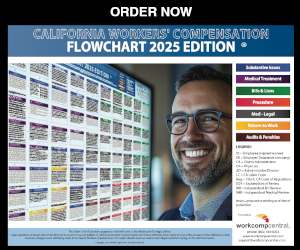Industry Insights
April 28, 2021
Grinberg: Statute of Limitations Bars MVA Claim
- State: California
- - 0 shares
It is a rare enough event to have the statute of limitations bar a claim. To start off, it is generally a “disfavored” defense because of the preference to have disputes resolved on the merits.

Gregory Grinberg
Further, the burden of proof is on the defendant to show that the statute of limitations would bar a claim, given that the statute of limitations is an affirmative defense.
Finally, as the Supreme Court held in Reynolds, when the employer knows of an industrial injury, it may be estopped from raising the statute of limitations defense if it fails to provide a claim form and notice of the right to workers’ compensation benefits.
In other words, it is no coincidence that the statute of limitations defense is often shortened to SoL.
So, imagine how pleased I was to see the case of Matani v. IHSS, a recent panel decision, where not only the judge found that applicant’s claim was barred by the statute of limitations, but the Workers' Compensation Appeals Board panel agreed on reconsideration.
Applicant Matani worked for IHSS, although this was solely in the capacity of taking care of his father, which included, among other duties, driving his father to and from his medical appointments. In September 2014, applicant was involved in a traffic accident but did not file a workers’ compensation claim. Instead, he waited until October of 2017 to file.
Labor Code 5405(a) provides that an application must be filed no later than one year from the date of injury, and applicant waited more than three years. Defendant denied the claim, arguing that it had no notice that there was an industrial injury.
So, if the accident happened in 2014 and an application wasn’t filed until 2017, that would seem to suggest the claim is barred by the statute of limitations, no?
Well, applicant offered his own theory on why the statute of limitations should be tolled. First, he claimed that he sent a facsimile to his supervisor advising that he had “met with accident.” He could not remember if he mentioned transporting his father at the time, and records subpoenaed from defendant did not include any such facsimile.
Defendant put on witnesses to testify that the clerical staff is trained to review facsimiles for industrial claims and report them immediately and that no such report was made in this case.
Further, applicant claimed he had a phone conversation in October of 2014 with his caseworkers in which he advised them of the accident involving him and his father. However, defense witnesses disputed this as part of the conversation and testified that no motor vehicle accident was mentioned during the phone call.
The WCAB affirmed the trial judge’s order that the applicant take nothing by way of his claim. The panel reasoned that he had actual knowledge that his injury was industrial in nature, since he was transporting his father to a medical appointment and was being compensated for his time by IHSS.
Further, to trigger the tolling of the statute of limitations, applicant would have had to show actual or constructive notice of an industrial injury. The “should have known” standard does not apply to triggering the duty to provide a claim form.
By showing that no application was filed within a year of the date of injury, defendant successfully raised the statute of limitations defense. By applicant failing to show that defendant had “actual or constructive” notice of an industrial injury being claimed within one year of it occurring, the defense was allowed to stand.
So, some takeaways from the Matani case: Although defendant bears the initial burden with respect to the affirmative defense of statute of limitations, once this is shown, the Matani panel would shift the burden to applicant to prove actual or constructive knowledge. Further, defendant was able to effectively negate any such effort to toll the statute of limitations by offering witness of its own regarding the habit and regular procedures used by defendant to identify and respond to alleged industrial injuries.
So, overall, not a bad result for the defense community.
Gregory Grinberg is managing partner of Gale, Sutow & Associates’ S.F. Bay South office and a certified specialist in workers’ compensation law. This post is reprinted with permission from Grinberg’s WCDefenseCA blog.
Advertisements
Columns
- Gelman: The Toll of Neglect 04/25/25
- CAAA: Fraud in the Workers' Comp System 04/23/25
- Gelman: Broken Medical Promises 04/21/25
- Langham: Never Give Up, Never Surrender 04/18/25
- CAAA: The Dismantling of NIOSH 04/16/25
- Ahmed: Strategies for Successful Negotiation 04/14/25
- Shabestari: Addressing Venue in Work Comp Claims 04/11/25
- Snyder: Do You Trust Your Mediator? 04/09/25
- Gelman: Beyond the Knife for Back Pain Relief 04/04/25
- Montgomery: Changes to Workers' Comp DME Authorization 04/02/25
- Langham: Notice of Unavailability 04/01/25
- Moore: Critical Workers' Comp Business Change Reporting Requirement 03/31/25
- Mussack: AMA Guides, State PDRS Can Differ on Rating Instructions 03/28/25
- Kamin: Hope Springs Eternal With New District Attorney 03/26/25
- Langham: DOGE 2025 03/24/25
- Paduda: What's Happening in Work Comp M&A? 03/21/25
- Gelman: Will DOGE Changes Cause Workers' Comp Costs to Rise? 03/20/25
- Gelman: High Court OKs Referral Fees 03/19/25
- Snyder: The Importance of Taking Notes 03/17/25
- Snyder: How Negotiation Is Like Art Forgery 03/14/25
Now Trending
- Workers' Compensation News
-
Calif. Four
Charged in Alleged Capping Scheme
Targeting Spanish-Speaking…
Posted on Apr 25, 2025
-
Calif. Insurance
Committee Passes SIBTF, IBR…
Posted on Apr 24, 2025
-
Calif. Amended
Bill Requires Negative Impact of
Preexisting Disability for SIBTF…
Posted on Apr 23, 2025
-
Calif. Court
Affirms Jury's Verdict Finding L.A.
Failed to Engage in Interactive…
Posted on Apr 22, 2025
-
Calif. Comp Claim
From Staged Robbery Leads to Fraud…
Posted on Apr 25, 2025
-
Calif. Court
Denies Motion for Acquittal, New
Trial by Labor Org Convicted of…
Posted on Apr 21, 2025
-
Calif. CWCI
Reports 16% Increase in QMEs, 17%
Increase in Requests for…
Posted on Apr 18, 2025
-
Hawaii High Court:
Landlord Failed to Rebut
Presumption That Tenant Was…
Posted on Apr 25, 2025
-
Texas Senate
Passes Bill to Discontinue Group…
Posted on Apr 18, 2025
-
Ntl. DOJ Announces
$300 Million Opioid Settlement With…
Posted on Apr 22, 2025
Jobs
Upcoming Events
May 12-14, 2025
NCCI Annual Insights Symposium
NCCI's Annual Insights Symposium (AIS) 2025 will deliver data-driven insights, providing workers c …
May 12-13, 2025
CSIA 2025 Annual Conference
The Board of Managers is excited to announce that the CSIA 2025 Annual Meeting and Educational Con …
Jun 11-13, 2025
CCWC 2025 Educational Conferen
For two decades, CCWC has assembled the key players in the workers’ compensation arena for what is …
Social Media Links
c/o Business Insurance Holdings, Inc.
Greenwich, CT 06836




No Comments
Log in to post a comment